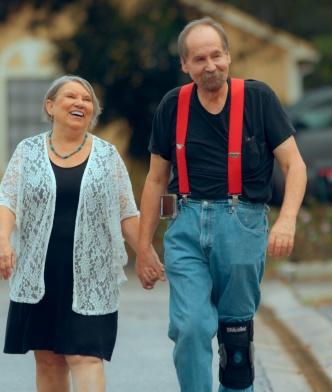What Injuries Can You Get From Falling?
What Injuries Can You Get From Falling?
Rating Overview
- The Fee Is Free Unless You Win®.
- America's Largest Injury Law Firm™
- Protecting Families Since 1988
- 20 Billion+ Won
- 1,000+ Lawyers Nationwide
Free Case Evaluation

The attorneys featured above are licensed in Florida. For a full list of attorneys in your state please visit our attorney page.
What Injuries Can You Get From Falling?
On average, over 800,000 people in the U.S. are hospitalized each year for injuries caused by a fall. About 9 million people per year end up in the emergency room for this common mishap. Furthermore, slip and fall accidents are a leading cause of unintentional death. The recovery process for a fall injury usually requires considerable medical care, physical therapy, and rehabilitation. Some falls are serious enough to cause permanent disabilities that may require long-term care.
Slip and fall accidents are particularly hard on older adults (65 and older), with an estimated 300,000 hospitalizations each year for hip fractures. While some falls are unavoidable, others may be directly linked to negligence on behalf of property owners. Whenever you sustain fall injuries on someone else's property, it might be possible to recover compensation from the property owner's insurance policy.
These claims typically fall under premises liability. However, if you're injured from a fall at work, you would go through your employer's workers' compensation insurance. In either scenario, the slip-and-fall lawyers at Morgan and Morgan can work with you to determine if your claim is worth pursuing.
How it works
It's easy to get started.
The Fee Is Free™. Only pay if we win.
Results may vary depending on your particular facts and legal circumstances.
Step 1
Submit
your claimWith a free case evaluation, submitting your case is easy with Morgan & Morgan.
Step 2
We take
actionOur dedicated team gets to work investigating your claim.
Step 3
We fight
for youIf we take on the case, our team fights to get you the results you deserve.
FAQ
Get answers to commonly asked questions about our legal services and learn how we may assist you with your case.
What Are the Most Common Fall Injuries?
While a fall can cause a wide variety of health issues, here are some common fall injuries that might warrant a legal claim to recover compensation:
Broken bones - Fractures occur when more force is put on a bone than it can tolerate. Anytime you fall, tremendous stress is applied to bones throughout the body. Hips, wrist, shoulder, arm, knee, and ankle bones are most vulnerable to fracture from a fall, and the likelihood of breaking a bone increases with age. However, individuals of any age can suffer a bone break under the right circumstances. Many times, people will try to break a fall with their hands if they have an opportunity, but that depends on how the person falls.
Bone fractures range from mild to severe. While any bone break can cause discomfort, in order to heal, the individual will have to rest the affected area and cannot apply pressure or use the affected body part for some time.
Soft tissue injuries - Soft tissue injuries occur in muscles, ligaments, and tendons resulting in pain, bruising, swelling, and other tissue damage. When ligaments and tendons are torn, surgery may be required to repair them. When left untreated, soft tissue injuries can end up causing chronic pain and make other injuries more likely in the future.
Traumatic brain injuries (TBIs) - TBIs occur when there is a violent blow, bump or jolt to the head, which is a common occurrence in a fall. TBIs can range in severity from mild concussions to permanent brain damage, and the signs and symptoms may take a while to develop. In some cases, symptoms may take months to appear. Long-term effects can include memory or concentration issues, problems with speech, mood swings, seizures, agitation, and loss of coordination.
Hip fractures - Falls account for 95% of broken hip bones and will usually require surgery, hospitalization, and rehabilitation. Hip fractures are particularly dangerous in older adults because they are difficult to recover from, and complications are common. Older individuals may have existing health issues that make recovery far more challenging.
Sprained ankles and wrists - Sprain injuries occur when a ligament is distended or torn within a joint. Falling or slipping can knock an ankle or wrist joint out of position, causing the supporting ligaments to stretch or tear, resulting in pain, swelling, bruising, instability of the affected area, and loss of ability to use the injured joint. Sprained ankles and wrists can take a long time to heal, which can greatly impact your ability to do everyday tasks like walking, cooking, and typing.
Lacerations and abrasions - While not as serious as other fall injuries, a nasty cut or scrape can leave you with discomfort and scarring. This type of injury is usually caused by falling on objects that are sharp or landing hard and typically affects the legs, hands, arms, hips, and head. Lacerations and abrasions are often coupled with more significant injuries like broken bones and sprains.
Back and spinal cord injuries - Slip and fall accidents can result in fractured vertebrae, slipped and herniated discs, and even paralysis or death. Any damage to the spinal cord often causes lifelong changes in stability and function below the site of the injury. Anyone who suffers trauma to the head or neck should be checked out for a spinal injury, as numbness or paralysis can come on gradually.
Shoulder and neck injuries - In the event of a fall, the neck and shoulders can be harmed when you try to catch yourself or when you land. Neck injuries can be very serious as they are linked to the spinal cord. In the best-case scenario, you may have pulled muscles which can still be painful. However, a significant neck injury can result in paralysis.
Shoulder injuries from slip and fall accidents may include dislocation, broken collarbones, or nerve damage. If your shoulder was dislocated, you could be looking at 12 to 16 weeks to recover fully, and you'll likely suffer repeat dislocations in the future as the shoulder is the body's most flexible joint.
Knee injuries - Knees are prone to twist during a fall which can cause long-lasting damage. Knees are among the most complicated areas of the body as it comprises a cluster of bones and ligaments. Falling hard on your knee or twisting it can tear your MCL or ACL, and the patella can be dislocated. This kind of damage may require knee surgery to repair.
How Do I Know if My Fall Was Serious?
At Morgan and Morgan, we always recommend that our clients seek medical care as soon as possible after an accident. There are many reasons for this. Primarily, we want you to get the medical attention you need for your well-being. A secondary reason involves getting compensation for slip and fall accidents. For a chance at a successful claim, a healthcare provider must officially document the injury. Suppose you fell on someone else's property and were not hurt. In that case, there is little reason to pursue a civil matter, even if the property owner was negligent in their duty of care to ensure safe premises.
Still, the only way to be assured you haven't suffered an injury is to visit a physician. As we mentioned previously, some very grave injuries may take a while to become evident. Here are some signs that may indicate your fall is serious.
Ongoing pain - When you strike the ground or other objects during a fall, the initial jolt will likely cause a spark of pain. While you may gather yourself and feel relatively okay, adrenaline may mask the pain. As stated above, we always recommend you get a once-over by a physician after a fall, but if some time has passed and you're still feeling pain, seeking medical care should be a priority as it could indicate underlying damage.
You feel sudden sharp pain - Most people think a broken bone should be immediately obvious. However, that's only sometimes the case, especially with bone cracks. Outward symptoms include swelling and pain that increases over time. Sprains and strains have the same symptoms, which can also be serious.
You have these telltale signs of a head injury - Anytime you hit your head in a slip and fall, getting checked out by a doctor is crucial. Head trauma can cause blood to collect inside the skull putting tremendous pressure on the brain, which can lead to coma or death. Look out for these telltale signs that could indicate a severe head injury:
- Changes in vision like blurriness or tunnel vision
- Ringing in your ears
- Headache
- Dizziness, loss of balance, or vertigo
- Confusion or feeling dazed
Your back pain level has increased - Almost ten percent of us are subject to chronic back pain, which makes a new injury from a fall harder to identify. However, a trip to the doctor is recommended if you feel new or emerging back pain that you did not feel before. Any back pain after a fall should be examined for those with no previous back pain trouble, as it may indicate strained muscles or herniated discs.
You sustain a substantial cut - Depending on where you fall, there may be sharp objects that can cut. This kind of injury can cause bleeding and infection and result in scarring. Timely treatment can lower the chances of scarring and infection.
You're suffering from stomach pain - Sudden and unexplained stomach pain can indicate an internal injury after a fall, even if you didn't land on your stomach. Internal bleeding should be addressed immediately.
You develop significant bruising - People can get up and brush it off after a fall, thinking that the pain will subside in a few minutes. However, considerable bruising can often mean that more serious injuries are at play, like internal bleeding, sprains, and strains.
You develop mobility issues- In the aftermath of a fall, stiffness is common. However, suppose soreness limits your mobility or gets worse. In that case, it could indicate something more serious in nature, like a cracked bone, spinal cord damage, or back injuries. Spinal cord injuries are among the most concerning and should be dealt with urgently.
You feel that something is not right with your body - We are all guilty of looking up symptoms online to avoid a trip to the doctor. Still, self-diagnosis is never a good idea, especially when some injuries can be life-threatening. Suppose you feel like something isn't right with your body after a fall. In that case, a medical evaluation will be the only thing to put your mind at rest and ensure any hidden injuries are caught and treated.
Can Slip-and-Fall Lawyers Help Me to Recover Compensation?
Slip and fall accidents can disrupt your life and impact your ability to make a living. When the fall results from a property owner's negligence, you may be able to recover compensation. The area of the law that covers slip and fall accidents is known as premises liability. Property owners have a duty of care toward visitors to ensure they are not harmed while on their premises.
The laws in your state will dictate under what circumstances you can bring a premises liability claim against the property owner. Broadly, it will revolve around your status as a visitor to a property, meaning if you were on the property with the knowledge and consent of the property owner.
Generally, the property owner will need to have been aware of (or should have reasonably been aware of) the dangerous condition on the property that led to your injuries but did not take steps to fix or warn of the situation. Frequently, slip and fall claims can be challenging because of all the legal elements that must be met to have a valid claim. That's where Morgan and Morgan can help.
With offices in every state and slip-and-fall lawyers specializing in premises liability law, your chances of success can significantly improve when represented by Morgan and Morgan. Every person has a right to sue for damages when a negligent party is responsible for causing their injury.
Get in touch with us today for a free case evaluation. We can help you with an insurance claim that may cover expenses for medical care, lost income, pain and suffering, and more.






